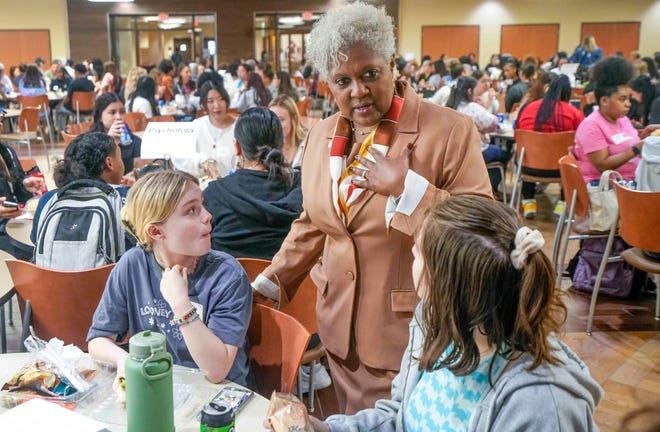
When Alverno College senior Trea Green walks by the school’s wall of presidents, she’s seen only white faces.
But that will change this year with Christy Brown, the first African-American to lead the small Catholic women’s college on Milwaukee’s south side.
“Finally seeing some diversity in our leadership is inspiring, especially because we’re a campus that prides ourselves on our diversity,” Green said.
Alverno hiring Brown, 58, caps off a period in which the college’s student body has grown more diverse. Federal education data show two-thirds of undergraduates were students of color in fall 2021, up from a little less than half a decade ago.
But sustaining Alverno’s mission — educating students who have historically been left out of higher education with a unique no-grades curriculum — has become increasingly more difficult.
Alverno is a smaller school than it used to be. Fewer students enrolled means fewer tuition dollars to keep the campus running. But raising tuition year after year is a hard sell for a school focused on moving low-income students up on the economic ladder.
Financial pressures are ever-constant, and costs only keep increasing. Alverno has run deficits in four of the last five years, according to tax filings.
Alverno’s challenges echo those of Cardinal Stritch University, a similarly small, religious institution that abruptly announced its closure this spring. Brown said she had already accepted the job before the news broke, and she didn’t even consider changing course.
“We need to continue to evaluate what’s the smart way to move forward because it is challenging,” she said in an interview. “We don’t have the resources of a large institution, and we also serve a community that has somewhat more needs than other schools might serve. … I am here to make sure our mission continues.”
Brown is a Milwaukee native with previous jobs at UW-Milwaukee, MATC, Girl Scouts
Brown grew up in northwest Milwaukee, a place that’s been subjected to decades of redlining and systemic racism, where two-thirds of the children live in poverty and most residents are Black.
Despite the notorious reputation of the 53206 zip code, Brown said she had a wonderful childhood. Her father worked at the post office before inheriting a family business removing trash for African-American companies. Her mother worked a variety of jobs for the U.S. Department of Veterans Affairs, Avon and as a secretary at a law office. Neither of her parents earned college degrees, but postsecondary education was a given for Brown and her two older siblings.
“They always said ‘when you go to college,’ not ‘if you go to college,'” she recalled. “It was just assumed we were going.”
Brown enrolled at Stanford University, mostly for the warm weather, she said. Later, she took the leap and went to law school at Duke University.

Brown has spent her entire working career in Milwaukee. She started at Michael Best law firm, moved over to Lutheran Social Services, did a stint at Milwaukee Area Technical College and spent five years at UW-Milwaukee.
Most recently, she led the southeast Wisconsin chapter of the Girl Scouts. The job exposed her to Alverno through an annual summer camp and a collaboration with the college’s Research Center for Women and Girls.
Outside of work, Brown is a wife and mom to two children. She dropped her daughter off at college for the first time in mid-August.
Brown is warm, friendly and funny. Although she’s only the second Alverno president who is not part of a religious order, she’s quick to joke that as a Black woman she’s a “sister” in her own way.
“Sorry, I couldn’t resist,” she said with a laugh.
Alverno’s student body is diverse but getting smaller
The diversity of Alverno’s student body largely stands apart from most other Wisconsin schools. It’s one of just three in the Milwaukee area that serves a student population where the majority is not white.
A big boost came in 2017, when Alverno became the first college in Wisconsin to be designated as a Hispanic-serving institution. Colleges with 25% or more of the student body identifying as Hispanic/Latino receive the coveted federal designation, opening the door to millions of dollars in federal grants and scholarships. That’s helped financially struggling students stay in school and led to higher graduation rates for Alverno in recent years.
Like most higher education institutions in Wisconsin, Alverno’s enrollment is declining. As many as 2,200 full-time equivalent students enrolled in the late 2000s but that’s dropped to about 1,500, according to federal enrollment data.
Brown has faced falling numbers frequently throughout her career. Most recently, she said, Girl Scouts participation fell during the pandemic. The organization had to make hard decisions about staffing levels, cutting about 50 positions from the 110 employed in southeastern Wisconsin when she began.
“Right-sizing an organization is a very, very controversial decision,” she said. “Because you have a lot of people who are devoted to the job and to the mission but you realize that it’s a cost. And if you continue to have that cost, you can’t serve people.”
Any time Brown has had to cut staff, she said she tried being humane and explaining how she came to her decisions.
Does Alverno need to be right-sized? Brown said she’s not committed to layoffs or furloughs but is looking for other ways to find efficiencies, like leaving vacant positions unfilled. Fundraising will help, too.
“Part of the goal I have is to be more explicit about what our needs are to those in the community who share our vision,” she said.
Alverno has an abilities-based curriculum and no letter grades
Brown’s first year as president aligns with the 50th anniversary of Alverno’s unique curriculum. Students master not only the content of their subjects but also “learning abilities” such as problem solving and communication. Classes are highly interactive with lots of projects and discussions but no letter grades.
“You don’t do a lot of memorization here,” said Green, the student excited to see Brown added to the wall of presidents. “You earn these skills, and you have to prove that you’ve earned these skills in whatever class you’re doing.”
Green was a self-described “chronic grade-checker” in high school.
“Taking that away kind of made school easier because I didn’t stress about, like, ‘I turned my homework in, did they grade it?'” she said. “It made me think more about what I’m actually studying than how I performed on it.”

The curriculum has received worldwide acclaim, attracting academics across the world for annual workshops to learn how to incorporate the model into their own institutions. Yet few outside the higher education world know about it.
“It’s a well-kept secret about who Alverno is and what we do,” Brown said.
Chloe Brown, a junior studying business management —who isn’t related to Alverno’s new president — didn’t know a college without grades existed until she toured Alverno.
“When they explained it to me, I was like ‘That actually sounds like way smarter. Why aren’t all the schools doing this?’” she said. “If it was taught like this in high school, I think so many more students wouldn’t struggle and would actually be able to figure out their interests.”
More than half of respondents in a recent alumni survey said Alverno’s curriculum was “much more” rigorous than a traditional letter-grading system, while three-fourths felt Alverno’s model held them “much more” accountable.
One of Brown’s biggest jobs, she said, is sharing Alverno’s story with the broader community.
“It’s a great thing in our community that I think for too long has been trying to serve quietly,” Brown said. “I’ll also say as a woman and as women’s institution, sometimes women don’t ask for what they need. They try to take it all on their shoulders and try to get the job done. … Now we need to let the world know this is who we are.”
Contact Kelly Meyerhofer at kmeyerhofer@gannett.com. Follow her on Twitter at @KellyMeyerhofer.




